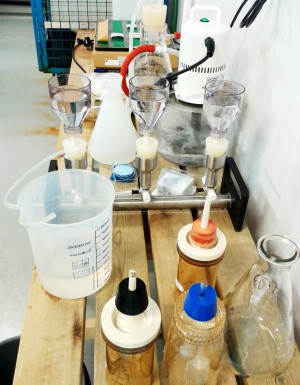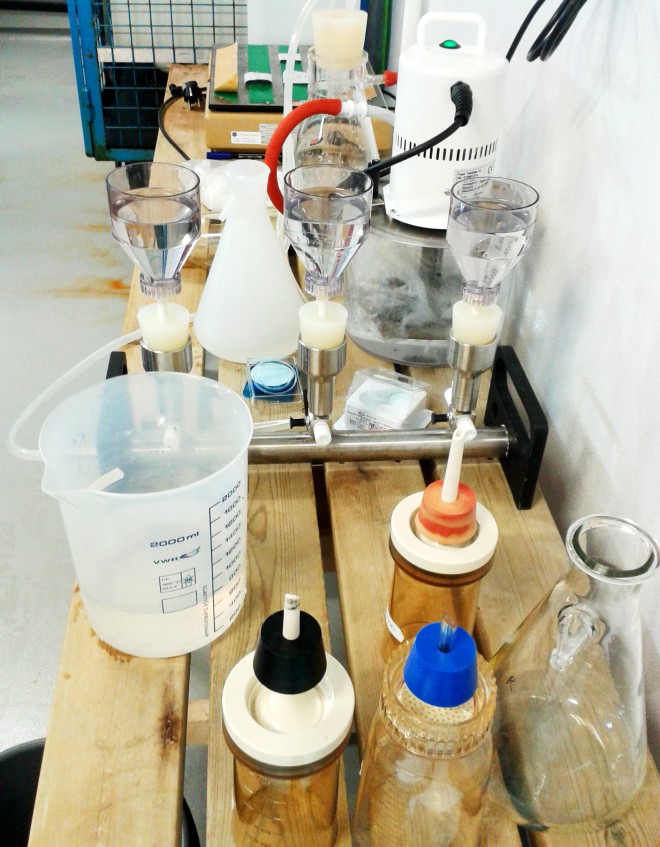 This spring, I had the opportunity to be a “student in research” on a fellow project with Ragnhild I. Vestrum which includes cultivation of cod larvae free from unwanted organisms. Along with Ragnhild, postdoc Torunn Forberg, and several people from the research group “Analysis and control of microbial systems” I have worked about 40 hours on the project.
This spring, I had the opportunity to be a “student in research” on a fellow project with Ragnhild I. Vestrum which includes cultivation of cod larvae free from unwanted organisms. Along with Ragnhild, postdoc Torunn Forberg, and several people from the research group “Analysis and control of microbial systems” I have worked about 40 hours on the project.
Student research is work paid by the hour that allows students to participate in research under the guidance of the department the student belongs to. This provides a golden opportunity to specialize in the chosen field of study.
The job description included several relevant tasks for a novice like me. If I were to list everything I have learned during the project this blog post would be very long, but there are many valuable lessons I take with me from here. For example, before the project, I had never heard of autoclaving, although I quickly realized that the autoclave has to be the most widely used machine at the department (device used to sterilize equipment). I did learn how to make various culture media containing the algae agar which I later learned to pour into Petri dishes. This is perhaps the ABC in the biotech world, but I think it was incredibly helpful to learn both sterile technique and how to make your own petri dishes, when the only previous knowledge we have of petri dishes is that they are readily available in the lab.
There were also some practical preparations with equipment setup such as culture bottles etc. One thing was to learn about the optimal living conditions for cod larvae, another was to see problem solving in action – working from your own ideas without a recipe, and all the practical problems one encounters along the way. Only now have I realized how important it is to make creative and adaptable solutions, and I witnessed several ingenious McGyver solutions as challenges arose.
Here appeared the good cooperation between the employees of the department, how many came with improvements in procedures done earlier. Everyone plays an important role with their own expertise. It is clear that the good team spirit and relaxed atmosphere contributes to a creative and spacious environment to work in. The department has an incredibly warm, tolerant and welcoming environment.
In addition, I got the answer to everything I asked about and more, with a particularly educational guidance. I have probably asked the same question 3-4 times and received a patient and thorough answer every time. The supervisor has been eager to show and explain the experiments and procedures even on things I could not work with (because it is a sterile experiment), and given me insight into the research world. I also got to attend another research project down on SeaLab where we collected samples to analyze of R-and K-selected communities, so the experience I am left with is both broad and specific.
Although it has been incredibly fun and useful to learn specific tasks, I think perhaps that the totality of the experience is most important. I have seen how it is to do research in the big picture; preparation, teamwork and how many things cannot be planned exactly and need to be dealt with spontaneously since you are working with living material. How one is dependent on suppliers, sharing equipment, replication, HSE procedures and applications to experiments with animals, that planning and preparation are very important but also being creative in terms of both equipment and procedure – there is no common formula when doing research that has not been done earlier.
Okay, but what is the catch here, you might ask? Before I was a bit worried that it would interfere with my exam period when the project was planned for April and May, but it turned out to be zero problems when it was made clear that no studying would be sacrificed for the project and that I had to say no if it did not work out. It has been very flexible and the working hours were planned for when it was convenient for me. It has by no means affected my school plan negatively, and I think that if this is made clear in the job description, more people will want to apply for a “student in research” position. That is the main reason why my fellow students did not apply for the position.
Finally, I would like to thank Ingrid Bakke for the opportunity to participate in this project. I have learned a lot and got a taste of biotechnology in practice. Thanks to Ragnhild for super guidance and cooperation, patience and work hours filled with laughter. Such a project provides a broader perspective and decreases the distance to the research world, and is really something I highly recommend that the department continues with in the future.
